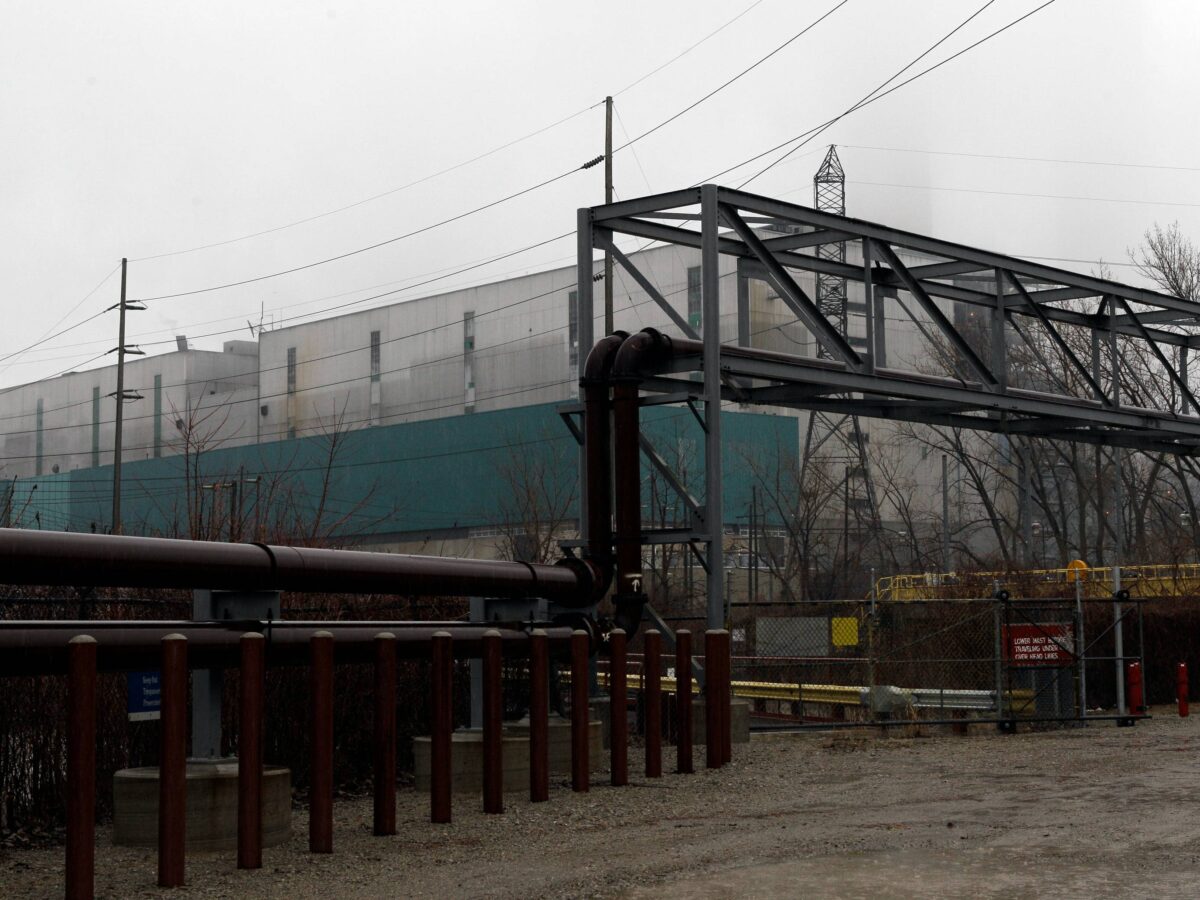Overview:
-The Trump administration's potential easing of environmental restrictions could pave the way for DTE Energy to construct new gas plants, CEO Jerry Norcia said earlier this month.
-Environmental advocates are poised to challenge any dilution of federal clean power regulations, warning of increased greenhouse emissions and air pollution.
The Trump administration may make it easier for DTE Energy to build new gas plants, according to statements DTE CEO Jerry Norcia made during a May 1 earnings call.
This follows a March announcement by Environmental Protection Agency Administrator Lee Zeldin that the agency would reconsider Biden-era clean power plant rules that require existing coal-fired plants and new, base-load, gas-fired plants to use carbon capture and sequestration/storage (CCS) to eliminate 90% of their carbon emissions by 2032.
On the earnings call, Norcia said DTE is “excited” that President Donald Trump’s administration may try to rescind EPA rule 111(d), which he said would make it “very expensive to build new gas plants.” Yet it’s another rule, 111(b), that applies to new power plants.
Norcia was speaking about rule 111(b), DTE spokesperson Jill Wilmot clarified in an email. She said that rolling back the federal rules would align “better with the state’s law.”
Michigan’s 2023 clean energy bill requires utilities to sell 80% clean energy by 2035 and 100% clean energy by 2040, later than the federal government’s 2032 deadline.
Environmental groups promise to fight a proposed weakening of federal clean power plant rules, which could mean more greenhouse emissions and air pollution. Experts say building more gas plants could also force Michiganders to pay for stranded assets if DTE needs to decommission plants because they’re uncompetitive with renewable energy.
Natural gas plants that need to be retrofitted with CCS are likely to be more expensive than renewable energy and may need to be decommissioned in the middle of their 30-year lifespans, according to Douglas Jester, a consultant with 5 Lakes Energy.
“It is highly likely that such a plant is going to wind up not operating very much,” he said, noting that this would lead to early plant retirements.
Michael Sullivan, an analyst at Wolfe Research, asked about the future of the company’s generation mix on the DTE earnings call and whether it could include new gas plants or ongoing coal use. Norcia responded that Trump’s executive orders could change the retirement dates for its coal plants.
A company spokesperson previously told Planet Detroit the Monroe coal plant would shut down by 2032 and the Belle River coal plant in St. Clair County would transition to gas generation by 2026.
“We may get some flexibility with our coal plants, but in the end we gotta shut them down,” Norcia said. “They’re quite old and need to be replaced with new technology.”
Shannon Fisk, director of state electric sector advocacy for the environmental legal group Earthjustice, said the closures were the subject of a binding settlement with the Michigan Public Service Commission that required the closure of two of Monroe’s coal units by 2028 and the remaining units by 2032. DTE’s coal units at the Belle River plant will convert to gas peakers in 2025 and 2026, generating power during periods of high demand.
DTE did not respond to a question about Norcia’s comments on coal plant retirements.
DTE operates nine natural gas power plants, according to MPSC data. DTE’s proposed generation mix for 2023 was 45% coal, 19% nuclear, 19% natural gas, 14% renewable, and 3% storage.
More gas plants would impact health, climate
The federal power plant rules requiring carbon capture and sequestration/storage are widely expected to encourage renewable energy, which many believe will prove more workable for utilities. Undermining these rules could mean more fossil fuel generation, climate warming emissions, and air pollution, experts warn.
The Supreme Court’s 2022 decision in West Virginia v. EPA said the agency doesn’t have the authority to require power plants to shift their generation to specific technologies like wind and solar. The EPA retained the power to regulate emissions from power plants, with the Biden-era rules allowing the agency to demand reductions in carbon pollution without mandating a specific approach.
“You would not design the system this way,” David Doniger, senior strategic director for climate and clean energy at the Natural Resources Defense Council, previously said of the EPA’s convoluted path to emission reductions. But he added that it was “an effective way to meet the climate crisis.”
Reversing course and allowing for more natural gas generation would mean additional greenhouse gas pollution, air pollution, and environmentally harmful gas extraction techniques like fracking, said Michael Gerrard, a professor at Columbia Law School specializing in climate change law.
Natural gas produces less carbon dioxide when burned than coal, but methane leaks can offset many of the emissions reductions from switching to gas, according to Desirée Plata, director of the Massachusetts Institute of Technology Methane Network. Natural gas is mostly methane, a greenhouse gas 28 times more potent than carbon dioxide at trapping heat in the atmosphere, although it persists for a shorter time period.
Natural gas plants also produce nitrogen oxides (NOX), which can aggravate respiratory diseases, especially asthma, and lead to hospitalization. Long-term exposure can lead to the development of asthma and susceptibility to respiratory infractions.
Gerrard said the economics of building natural gas plants with CCS are challenging.
“Renewables have really been dropping in price levels and they became highly competitive with natural gas,” he said. Rescinding 111 (b) would reduce the competitive advantage that renewables have, he added.
MORE REPORTING FROM PLANET DETROIT
Natural gas spending will cost Michigan ratepayers, hurt climate goals, report finds
Michigan’s gas customers face soaring bills as utilities invest heavily in infrastructure, says Citizens Utility Board of Michigan. These investments threaten climate goals and could disproportionately impact vulnerable communities, raising concerns about equity and environmental sustainability, report says.
DTE Energy, Consumers Energy shareholder returns drive up Michigan energy bills: ‘It’s costing consumers so much money’
A national study reveals investor-owned utilities are charging U.S. ratepayers up to $50 billion annually for shareholder profits.
Could Trump’s executive orders endanger Michigan’s climate laws?
Federal directives look to shut down state climate laws, revive coal. Experts say the president lacks the authority to overturn state law. DTE and Consumers say they will move forward with coal plant retirements.
Building new gas plants ‘wildly imprudent,’ expert says
If DTE decides to push forward with new gas plants, they may not be built until the 2030s because of the time needed to secure regulatory approval, purchase gas turbines, and build the plants, according to Earthjustice’s Fisk.
Plants built at that date without CCS may only operate for a few years until they must comply with the state’s 2035 and 2040 renewable energy standards, at which point they may no longer be profitable.
“The thought that they’re going to somehow build a gas plant, operate it for four years and then worry about how to achieve compliance with the standard would be wildly imprudent,” Fisk said.
Wilmot, with DTE, said the utility is exploring multiple “baseload technologies” to replace the Monroe coal plant, including nuclear and natural gas with CCS.
Although the compliance dates for the state climate law are later than the federal power plants rules, Fisk said Michigan’s law is stricter in the sense that it doesn’t include an exception for gas power plants that operate less than 40% of the time.
5 Lakes Energy’s Jester said that Michigan’s climate law doesn’t directly regulate power plants, but rather the energy that is sold in the state. This provides utilities with wiggle room to keep running polluting power plants if they sell the energy to the regional grid operator or use it to offset the roughly 8% of electricity lost in transmission before it reaches a customer, he said.
The Trump administration has also said it would target state climate laws, and the U.S. Department of Justice sued Michigan, Hawaii, New York, and Vermont last week over planned legal action against fossil fuel companies for damages caused by climate change. Fisk said he would expect the state to vigorously defend its clean energy law if it was challenged, arguing “case law very well establishes the rights of states to set their own climate and clean energy policies.”
He also cautioned that an effort to repeal federal clean power plants rules shouldn’t be viewed as a foregone conclusion.
“The rule itself has to go through a lengthy regulatory process,” he said. “We and many others will most likely … push back and explain why these rules are fully justified.”





